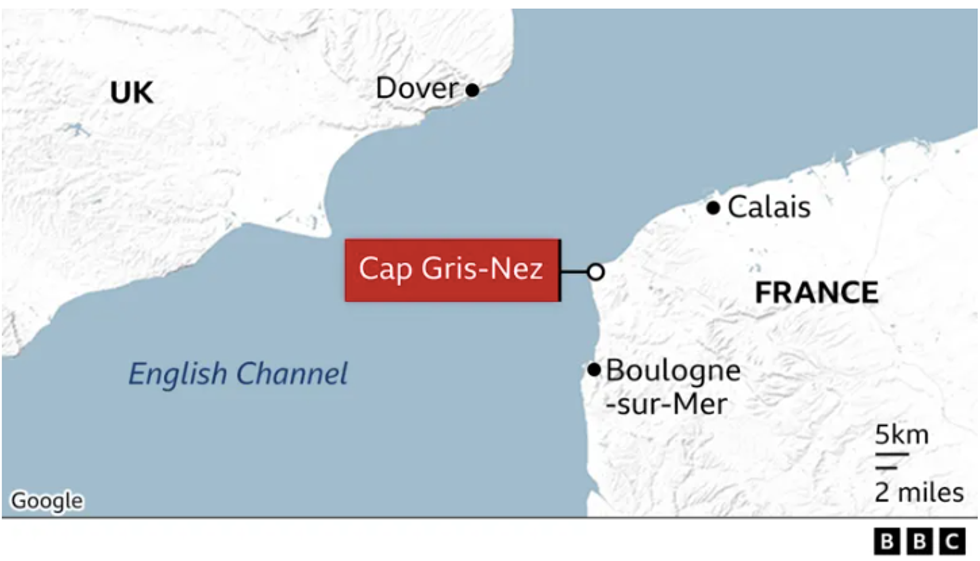Migrant Boat Capsizes in English Channel, Killing 12, Mostly Women and Girls
"We must create effective and humane pathways for those seeking refuge to reduce the need for dangerous crossings and prevent further tragedies."
A small boat carrying migrants in the English Channel sank off the coast of France on Tuesday, leading to at least 12 deaths, mostly of women and girls.
Ten of the dead were female, one of whom was pregnant, and six were minors; they were of "primarily of Eritrean origin," a French prosecutor told reporters, according toThe Guardian. The boat, which was about 23 feet long, was carrying roughly 70 passengers when the bottom collapsed. Most of them were rescued, and at least two people are in critical condition.
The overcrowded boat was bound for England but didn't make it far after setting off from the French coast, where migrants from war-torn countries in Africa, the Middle East, and elsewhere tend to gather in makeshift camps as they try to make it to the United Kingdom to claim asylum there. The boat "ripped open" near the Cap Gris-Nez, a cape whose cliffs mark the closest spot in France to England, with Dover just about 20 miles away.
The accident is the latest in a series of migration disasters in the channel in recent years. U.K. Prime Minister Keir Starmer, whose Labour Party has been in power since July, has declared a crackdown on 'gangs' involved in smuggling, but rights groups in the U.K. on Tuesday called for a broader set of reforms, including safe alternative routes into the country.
"In addition to taking action against the criminal gangs themselves, the [U.K.] government must develop a plan to improve and expand safe routes for those seeking safety," Enver Solomon, chief executive of Refugee Council, said in a statement.
"People risk their lives out of desperation, fleeing violence and persecution in countries like Afghanistan, Syria, and Sudan in search of safety," Solomon said. "We must create effective and humane pathways for those seeking refuge to reduce the need for dangerous crossings and prevent further tragedies."
Amnesty International U.K. refugee and migrant rights director Steve Valdez-Symonds agreed, arguing in a statement that "no amount of 'smash the gangs' policing and government rhetoric is going to stop these disasters from unfolding time and again if the needs of people exploited by those gangs remain unaddressed."
Wanda Wyporska, CEO of Safe Passage, also emphasized the need for safe routes.
"Today's tragedy must be the last," she said in a statement. "Without safe alternatives to reach protection in the U.K., people fleeing war and persecution will continue to make dangerous journeys at the hands of smugglers as they have no other choice. We must not accept this government's refusal to prioritize opening new safe routes."
Roughly 20,000 people have come to England by crossing the channel on small boats this year, according to U.K. government data. More than a dozen have died while trying to cross, including nine since the start of July.
The channel is a busy shipping zone with unpredictable weather, where small boat accidents are common. In November 2021, 27 people died in frigid waters off of Calais, France, after their dinghy deflated, and other such tragedies with smaller death tolls have followed over the last three years.
The Conservative-led U.K. government established a fiercely anti-migrant position and even set up a controversial system to transfer asylum-seekers to Rwanda. Labour abandoned the Rwanda deportation program and directed its antagonism at people smugglers. Progressives have, however, cautioned that overzealous policing of smuggling can led to migration itself being prosecuted.
Rights groups have emphasized that people who take boats to the U.K. overwhelmingly intend to enter a legal asylum process. More than 90% people who've arrived in the U.K. on small boats since 2018 claimed asylum, and of those who had received a decision by March, about 75% were successful, according to a recent analysis by the Migration Observatory at Oxford University.
Many of the people on the small boat crossings are from Eritrea, Afghanistan, Albania, Iraq, Iran, Sudan, and Syria. Eritrea, a country in the Horn of Africa, gained independence from Ethiopia in the early 1990s and has since been plagued by conflict and human rights abuses. The authoritarian government has a mandatory military conscription policy that drives people from the country; the conditions of service are extremely harsh and torture has been alleged.
Only eight of the migrants on board the small boat on Tuesday wore life vests, officials said. Smugglers often use boats that are not seaworthy, as they wouldn't want to lose a valuable asset, and they crowd the boats to maximize their profits.
Following the incident, Gérald Darmanin, France's outgoing interior minister, called for a new migration treaty with the U.K. to create legal pathways for migrants.
French and U.K. governments, largely tilting right on immigration in the last decade, have worked together to limit the flow of people to Britain by, for example, increasing security at the border crossing at Calais. The two countries signed a $576 million deal last year that rights groups called racist and illegal.
Many migrants prefer the U.K. to continental Europe because they have family connections there or because of their language skills, among other reasons.



